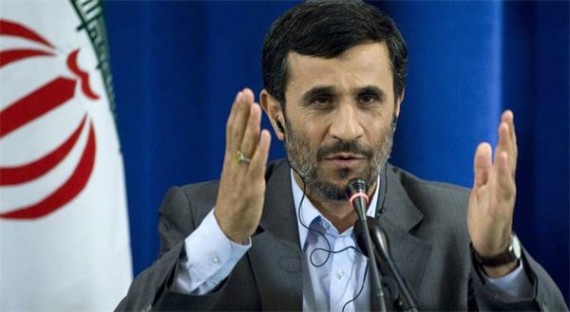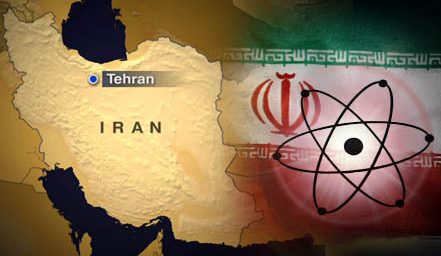Iran Nukes: Not So Fast?
Iran's path to a nuclear bomb isn't as easy as most think, Jacques Hymans argues in the current Foreign Policy.
Iran’s path to a nuclear bomb isn’t as easy as most think, Jacques Hymans argues in the current Foreign Policy.
In an essay titled “Botching the Bomb: Why Nuclear Weapons Programs Often Fail on Their Own — and Why Iran’s Might, Too,” (subscription required to read more than the abstract) Hymans points out that, while nuclear bomb technology is scientific child’s play, it’s nonetheless incredibly challenging from a management perspective.
“Today, almost any industrialized country can produce a nuclear weapon in four to five years,” a former chief of Israeli military intelligence recently wrote in The New York Times, echoing a widely held belief. Indeed, the more nuclear technology and know-how have diffused around the world, the more the timeline for building a bomb should have shrunk. But in fact, rather than speeding up over the past four decades, proliferation has gone into slow motion.
Seven countries launched dedicated nuclear weapons projects before 1970, and all seven succeeded in relatively short order. By contrast, of the ten countries that have launched dedicated nuclear weapons projects since 1970, only three have achieved a bomb. And only one of the six states that failed — Iraq — had made much progress toward its ultimate goal by the time it gave up trying. (The jury is still out on Iran’s program.) What is more, even the successful projects of recent decades have needed a long time to achieve their ends. The average timeline to the bomb for successful projects launched before 1970 was about seven years; the average timeline to the bomb for successful projects launched after 1970 has been about 17 years.
The reason, Hymans contends, isn’t the success of international institutions like the non-proliferation treaty or real or possible military threats against would-be nuclear possessors.
A more convincing explanation of the proliferation slowdown begins with the observation that during the early days of the nuclear age, most states with nuclear ambitions were in the developed world, whereas since the mid-1960s, most would-be nuclear states have been in the developing world. As proliferation has become a mainly developing-world phenomenon, timelines to the bomb have slowed down dramatically. But the relevant difference here is not primarily economic. Some nuclear programs in very poor states have fared rather well, such the one undertaken by famine-stricken China in the 1950s and 1960s. Conversely, wealthy oil states, such as Iraq and Libya, spent vast amounts on decades-long nuclear quests but still failed.
National income is only one dimension of development, however, and in this case it is not the most important one. As the political scientist Francis Fukuyama has stressed, despite strong rates of economic growth, most developing countries struggle to establish high-quality state bureaucracies. And a dysfunctional bureaucracy is likely to produce a dysfunctional nuclear weapons project.
Nuclear research and development organizations depend heavily on intense commitment, creative thinking, and a shared spirit of cooperation among large numbers of highly educated scientific and technical workers. To elicit this positive behavior, management needs to respect their professional autonomy and facilitate their efforts, and not simply order them around. Respect for professional autonomy was instrumental to the brilliant successes of the earliest nuclear weapons projects. Even in Stalin’s Soviet Union, as the historian David Holloway has written, “it is striking how the apparatus of the police state fused with the physics community to build the bomb. . . . [The physics community’s] autonomy was not destroyed by the creation of the nuclear project. It continued to exist within the administrative system that was set up to manage the project.”
By contrast, most rulers of recent would-be nuclear states have tended to rely on a coercive, authoritarian management approach to advance their quest for the bomb, using appeals to scientists’ greed and fear as the primary motivators. That coercive approach is a major mistake, because it produces a sense of alienation in the workers by removing their sense of professionalism. As a result, nuclear programs lose their way. Moreover, underneath these bad management choices lie bad management cultures. In developing states with inadequate civil service protections, every decision tends to become politicized, and state bureaucrats quickly learn to keep their heads down. Not even the highly technical matters faced by nuclear scientific and technical workers are safe from meddling politicians. The result is precisely the reverse of what the politicians intend: not heightened efficiency but rather a mixture of bureaucratic sloth, corruption, and endless blame shifting.
He contends that neither Iraq nor Libya got nearly as far in their nuclear efforts as widely believed and ascribes their failures to the repressive regimes.
Iraq’s experience notwithstanding, many proliferation analysts insist that although technologically backward states might not have been capable of nuclear weapons development in the past, they can now simply purchase all they need in the freewheeling globalized marketplace. Admittedly, illicit nuclear entrepreneurs — such as A. Q. Khan, the rogue Pakistani scientist who sold nuclear technology to Iran, Libya, and North Korea — do pose a threat. But international nuclear technology transfers often fail because the dysfunctional states that are trying to get the bomb are hardly any better at exploiting foreign nuclear know-how than they are at developing their own.
Libya’s misbegotten nuclear weapons project reflects this general pattern. Despite buying all the items in Khan’s catalog, Libya was unable to “put them together and make them work,” according to a 2005 U.S. government report. Indeed, when IAEA inspectors gained access to Libyan nuclear facilities after Libya’s president, Muammar al-Qaddafi, abandoned the project in 2003, they found much of the imported merchandise still in its original packing crates.
The analysis is interesting and plausible insofar as it goes. Of course, it doesn’t explain how Pakistan and North Korea managed to become nuclear possessors. To be sure, as Hymans notes in another piece, Pyongyang has thus far been unsuccessful at launching a rocket, severely limiting the plausibility of its nuclear threat.
The problem with all this is that, if you believe the risk of a nuclear Iran is “unacceptable”–or, in the case of Israel, an existential threat–relying on Iran’s bureaucratic incompetence is hardly satisfactory. It’s just not a bet you can afford to lose.







I’ve been hearing that Iran is 4-5 year away from producing nuclear weapons for, gosh I don’t even know how long. Most of my life, I think (I’m in my mid 40s). I’ve often wondered why it is that in spite of being “close” to success all this time, it never has succeeded. I suppose this might be part of the answer, but it is something I’d like to see explained.
So if I believe space aliens are beaming evil thoughts into my brain, ridding myself of the tinfoil hat is a bet I can not afford to lose?
Sloppy James. Very sloppy.
@ KariQ
I’ve been hearing that Europe’s socialized medicine systems are “on the verge of collapse” since 1980. That’s how it works when you make up your facts as you go along.
A fascinating theory but just a theory, unless there’s a lot more substantive evidence in the main article. Probably true, as far as it goes.
As an aside, are we required by law to continue calling A.Q. Kahn a “rogue?” I’ve never bought that for a minute. No way Pakistani intelligence didn’t know about it and facilitate it.
@OzarkHillbilly: The degree to which a nuclear Iran poses a serious security threat to Israel, much less the United States, is open to debate. I happen to be on the side that says that, while we’d be better off finding a diplomatic solution to buy them off, we could live with a nuclear Iran in the same way we live with a nuclear Pakistan and a nuclear North Korea. But if you’re a national decision-maker who believes otherwise, then the expected utility calculation changes.
I think that the major risk if the Iranians manage to build a nuclear bomb is precisely their bureaucratic incompetence.
@OzarkHillbilly:
He’s not suggesting this is a good or correct argument, he’s just saying that if one is convinced beyond dissuasion of a threat, that party cannot accept enemy incompetence as viable defense.
You ain’t just whistling dixie.
Indeed, if Tel Aviv goes up in a mushroom cloud it’ll be too late for the likes of Jacques Hymans to step up in front of their captive audiences of young kids on overpriced university campuses and to say: “My bad.”
@James Joyner:
@Ben Wolf:
Ummmmm….. yeeeeaaaaahhhh…. Like in 2003 when GWB believed Iraq had weapons of mass destruction? He made a different bet. Guess what? We lost.
Ben:
James said:
He is now singing a slightly different tune, but one that I find just as problematic.
It has been said that those who can not learn from history are doomed to repeat it, but geezez guys, this was only 9 years ago, and we are still paying the piper.
Now where have we heard this before?
Oh, yea –
if
Tel AvivNew York goes up in a mushroom cloudBeing a tool for warmongers in our own country is bad enough. Being a tool for warmongers in another country is just kind of idiotic.
Iran’s (and Persia’s, and Parthia’s before it) history is one of being, for the most part, a rational actor. I see nothing to support the concept they are counting the days until they can commit suicide.
Using your “reasoning”, the US should have launched a preemptive strike on the USSR in 1949. You seem to be as anxious to commit slaughter as you claim Iran to be.
@OzarkHillbilly:
I believe that was my point.
The only thing I’m taking away from this is “free-range science” is a good thing.
@Ben Wolf:
Ben, my apologies. I read James’s original as being in support of such stupidity…. I read your original as being of the same….
Ben, I cannot believe you wrote that. You are an intelligent human being….WTF????
It is not a good or correct argument…. However…. if one is convinced beyond all reason you can not accept the fact that they may be wrong??? that maybe YOU may be wrong????
I can not forget the smoking gun that was a mushroom cloud over some city somewhere.
History…. Learn from it.
And Ben? My point is that GW Bush was WRONG. Wrong wrong wrong wrong.
.
In other words,“if one is convinced beyond dissuasion of a threat,” and one is willing to launch a war costing hundreds of thousands of lives and hundreds of billions of dollars in the pursuit of a threat that does not exist (except in one’s own mind) one is an idiot. (see GWB)
Did you get that last part? I will repeat: “one is an idiot.”
Ben, I know you are not an idiot.
@Tsar Nicholas: lololololololtrollolololol
In other news:
CIA drone strike kills Al Qaeda leader wanted in USS Cole bombing
Read more: http://www.foxnews.com/world/2012/05/06/airstrike-kills-al-qaeda-leader-wanted-in-uss-cole-bombing-yemeni-officials-say/#ixzz1uAIV6vvj
Looking forward to hearing more about how Obama is Carter 2.0
TNick said:
Condoleezza Rice said:
So I’m left wondering…is TNick really an incompetent former Secretary of State that served an incompetent President?
I report…you decide.
So … the project will fail because nobody got PMP certification?
@James H:
That’s interesting….I wonder if it’s possible if the opposite of what Hymans proposes could be true as well, that a management culture run amok could doom these programs to failure as well as management insists that every step of the way is in accordance with the current flavour of project management principles, thereby choking the whole thing in paperwork and process.
@KariQ: Forget about Iran and Israel. There are bigger problems !! Three of Israel’s four neighboring states are facing turbulent times this month while students at Palestinian universities have held elections. The outcome in each instance will necessitate Israel to evaluate its national security policy. Egyptians are figuring out which presidential candidate they will vote for in the upcoming elections on 23 and 24 May while the parliamentary process is in disarray. The Syrian military is deployed to Dera’a, Homs, Banias and Damascus suburbs with little prospect for a settlement. Syria is holding elections today for a parliament that has no opposition It was in Jordan however that an unexpected turn of events took place with the resignation of Prime Minister Awn Khasawneh. He was only in office for six months having been hailed as an essential reformer having spent 10 years as a judge at the International Court of Justice in The Hague. Awn Khasawneh was abroad when the King summoned the deputy prime minister and interior minister to the Palace to sign the Royal decree extending the current Parliament session in order to pass the election law to further the King’s vision for political reform. Royal decree obligates the signature of the prime minister or his deputy in order for it to take effect. King Abdullah II had no confidence that Awn Khasawneh would sign it so he had waited for his absence to force the issue with his deputy. For Khasawneh, this was a public humiliation to his authority and as a result, he tendered his resignation to the King while still abroad in Turkey on a state visit. King Abdullah II immediately asked former prime minister and regime insider Fayez Tarawneh to form the new government making him the fourth Prime Minister since the onset of the Arab Spring demonstrations in January 2011. Tarawneh is one of the old guard, an ultra-conservative bureaucrat with the experience of 40 years at the Royal Palace as both foreign minister and prime minister. Awn Khasawne was the third Prime Minister where previously King Abdullah II had dismissed Prime Minister Rifai and Prime Minister Bakhit and their cabinets. At the onset of the Arab Spring King Abdullah II had stated in Washington that he wanted to have the prime minister of Jordan elected in 2012 and that he would give up some of his powers to the parliament and the prime minister. However progress has been slow since Jordan is renowned for military-intelligence-tribal elites feeling that it is their birth-right to have political power as the guardians of the regime where the King appoints the Prime Minister and cabinet. The Islamic Action Front, the political arm of the Muslim Brotherhood, has been leading dozens of demonstrations over the past year, demanding elected governments and fair elections noting its intentions to intensify these. To be sure the King is going through the motions of change but little indication of fulfilling them. From the view of the pro-democracy and pro-reform movements these events are considered bad news. Israel is watching these activities closely since the proposed reforms are discriminatory against population centers like Amman and Zarka where the majority of Palestinian-Jordanian citizens reside. This could inflame demonstrations and instability. On the other hand should the reforms be enacted the new Prime Minister’s tenure will be short since his key mission will be dissolving the parliament to hold parliamentary elections, which will require him, according to the new constitutional amendments, to submit his resignation leaving the stage for another government after the elections. Thus, we are likely to see two Jordanian governments before the end of the year. The later may well be influenced and elected by the large Palestinian population resident in Jordan. Should such reforms be enacted in Jordan with an elected Prime Minster then Israel will be faced with a new type of government both there and in Egypt. Relations with the two neighboring states that have peace treaties with Israel may well require re-negotiating. A further sign of the times facing Israel in the democratization process in the Middle East is the result of recent student elections at most Palestinian universities and junior colleges in Israel, including Birzeit University, Al-Quds University, Hebron University, the Polytechnic Institute in Hebron, and Bethlehem University. All in all, only 57% of 35,000 eligible took part in the elections. Fatah received nearly 53 % of the vote, with Hamas receiving about 38 %. The remaining seats went to leftist groups, such as the Popular Front for the Liberation of Palestine and Democratic Front for the Liberation of Palestine. While all this is taking place Israel was also set paved for its own elections in September. Demoracy – sure. The elction was cancelled becauuse the ruling party and the opposition formed a unity coalition at midnight last night. The opposition party being a new party that is a break away from the ruling party. This on the background of a new French President in May and the foreground of American Presidential elections in November. The United State’s and Israel’s considerations on their own national security policy in such an environment are under stress requiring elaborate intelligence gathering and analysis to determine a fundamental question on who determines national security policy in these countries: Elected Civilian Leaders or Career Civil Servants and Military Officers